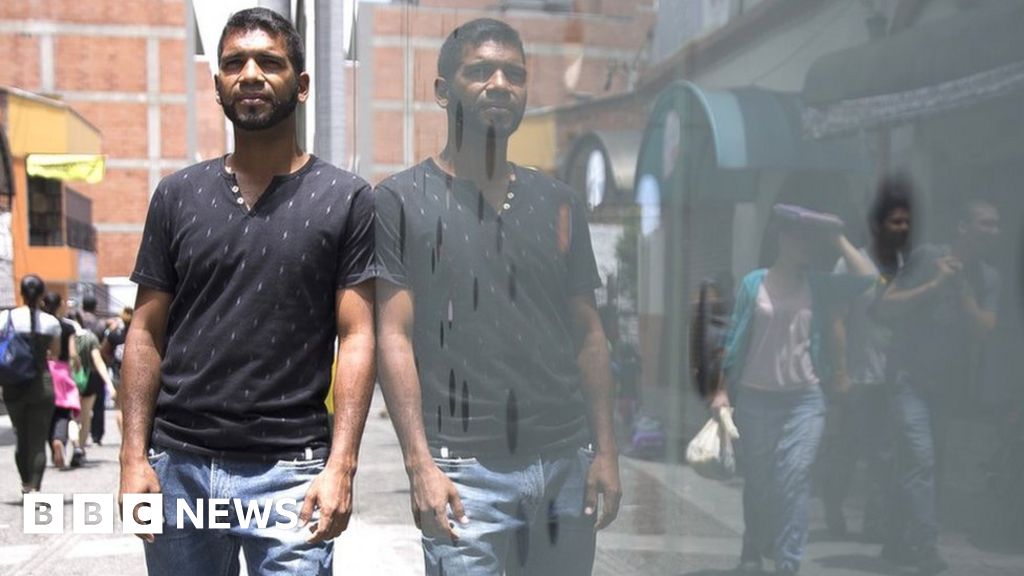Why Are Venezuelans Seeking Refuge In Crypto-currencies?

 Image copyright
Megan Janetsky
Image copyright
Megan Janetsky
Crypto-currencies have faced a lot of criticism since Bitcoin first came on the scene 10 years ago. But for one group of people, they're proving very useful.
Venezuela has seen its currency rendered practically valueless after suffering one of the worst periods of hyperinflation since World War Two.
A cup of coffee now costs 2,800 bolivars (21p; 28 cents), up from 0.75 bolivars 12 months ago - an increase of 373,233%, according to Bloomberg data. And that's after a 2018 devaluation that knocked five zeros off the currency.
More than three million Venezuelans have left the country, as essential goods such as toilet paper and medicine have become unaffordable and crime has soared.
As a result, many are turning to digital assets such as Bitcoin as an alternative to the Venezuelan bolivar.
And given how volatile Bitcoin is - its value has plunged from nearly £15,000 in 2017 to less than £3,000 now - it's an indication of just how desperate people have become.
Even the government has launched its own crypto-currency, the Petro, supposedly backed by oil, to provide a solution to the economic crisis.
But critics say it is a sham and there is no evidence of anyone using it.
Eli Meregote, 28, has been using Bitcoin and other crypto-currencies as a way of sending money home from Colombia where he now lives and works, avoiding the fees usually associated with money transfer services such as Western Union.
"I first discovered crypto in 2017 when I lost my job in Venezuela," the CCTV technician says. "Even if I had my job, it would've been useless anyway, because the minimum wage was $4 a month."
Cryptos offered him "total control" of his money "without banks or third parties", he says. "With Bitcoin and other crypto-currencies, I can send money home faster and without obstacles."

Media playback is unsupported on your device
Bitcoin was designed to be a global, digital currency that governments and banks couldn't interfere with. Like many other crypto-currencies it works by recording all transactions permanently on a distributed ledger called the blockchain.
Critics say Bitcoin and other cryptos - there are more than 1,600 globally - are unstable, use too much energy, and are used by money launderers or those wanting to buy illicit goods on the web.
But for Venezuelans, storing their money in a digital wallet in the form of Bitcoin, Litecoin, Dash or any of the others, is still a better option than holding on to the national currency.
Adoption has rocketed, with trading volumes on Localbitcoins.com - a person-to-person Bitcoin trading platform - rivalling those of the US.

Media playback is unsupported on your device
Although trading volumes dipped in March due to a power cut that plunged the country into darkness for days, February saw trading levels reach £6.84m ($8.76m) per week and nearly £1m per day, according to crypto-currency data tracker Coin Dance.
"Many Venezuelans are using Bitcoin to convert their bolivars, which are being permanently devalued by hyperinflation, to keep something of value," says economist Asdrubal Oliveros of Caracas-based consultancy Econanalitica.
"It is practically a vehicle for buying foreign currency and to conserve value, as it is relatively easy and you can keep small amounts which do not involve large investments."
Mr Oliveros points out that in Venezuela many people work as freelancers, receiving their pay in bitcoin since in most cases they do not have accounts abroad that allow them to make transfers in dollars.
"Receiving payments in bolivars does not make much sense," he says.
Matt Aaron, who manages the Venezuela arm of Bitcoin.com, the crypto-currency news and trading platform, says: "We pay our team members in Caracas in Bitcoin Cash. Transactions are instant and cost less than a cent to make."
Ricardo Carrasco, 29, an IT engineer who is paid in bitcoin, is a fan of the crypto-currency.
"It has given me access to the financial world outside Venezuela," he says. "We are not free to exchange our currency for US dollars or any other currency. We don't have access to the banking services of the world, so crypto allows you to bypass those barriers."
Mr Carrasco sells small amounts of Bitcoin on Localbitcoins.com and other exchanges, and receives money in bolivars to his Venezuelan account. He is then able to buy goods with his card as and when he needs to.
"It is a pretty simple, straightforward process," he says.
But Venezuela's government is intervening, recently launching a remittance service that caps the amount of crypto-currency someone inside the country can receive. It has started earning commissions from the transactions.
One thing is certain: despite the Bitcoin crash and loss in value of other crypto-currencies, Venezuelans have more interest in digital assets than ever before.
In the Colombian border town of Cucuta, which sees tens of thousands of fleeing Venezuelans arrive every day, a new crypto-currency cash machine (ATM) was opened in March.
It is designed to make carrying funds safer and more convenient.
"With the ATM, Venezuelans can receive bitcoin from anywhere in the world and cash out in Colombian pesos right away," says Matias Goldenhörn from Athena, the company that installed the machine.
"A Venezuelan family of four, getting on a bus in Cucuta to emigrate to Argentina, was carrying all their life savings in cash on their 14-day bus journey," he recalls.
"They just exchanged all the money into bitcoin and, once they arrived at their final destination, sold the crypto for the local currency, hence not risking travelling with the money on them.
"It made life a lot easier for them."
At least there is one country in the world where Bitcoin is serving a practical value for ordinary citizens rather than speculators.
Follow Technology of Business editor Matthew Wall on Twitter and Facebook
From Chip War To Cloud War: The Next Frontier In Global Tech Competition
The global chip war, characterized by intense competition among nations and corporations for supremacy in semiconductor ... Read more
The High Stakes Of Tech Regulation: Security Risks And Market Dynamics
The influence of tech giants in the global economy continues to grow, raising crucial questions about how to balance sec... Read more
The Tyranny Of Instagram Interiors: Why It's Time To Break Free From Algorithm-Driven Aesthetics
Instagram has become a dominant force in shaping interior design trends, offering a seemingly endless stream of inspirat... Read more
The Data Crunch In AI: Strategies For Sustainability
Exploring solutions to the imminent exhaustion of internet data for AI training.As the artificial intelligence (AI) indu... Read more
Google Abandons Four-Year Effort To Remove Cookies From Chrome Browser
After four years of dedicated effort, Google has decided to abandon its plan to remove third-party cookies from its Chro... Read more
LinkedIn Embraces AI And Gamification To Drive User Engagement And Revenue
In an effort to tackle slowing revenue growth and enhance user engagement, LinkedIn is turning to artificial intelligenc... Read more

